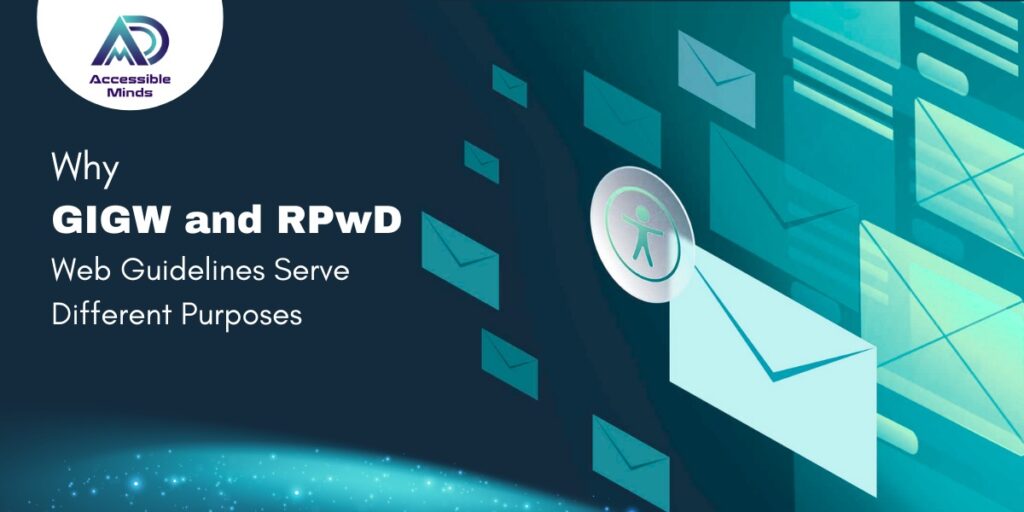In India, digital accessibility has become a pressing priority as more services, information, and interactions move online. Government policies and legal frameworks are evolving to ensure that websites and digital platforms are inclusive and accessible for persons with disabilities (PwDs). Two key frameworks often referenced in this context are the Guidelines for Indian Government Websites (GIGW) and the Rights of Persons with Disabilities (RPwD) Act, 2016.
Although both address accessibility, they serve different purposes. Understanding these distinctions is crucial for organizations, government bodies, and private entities to ensure compliance, improve inclusivity, and avoid legal risks.
What is GIGW?
The Guidelines for Indian Government Websites (GIGW) were developed by the National Informatics Centre (NIC) in collaboration with the Ministry of Electronics and Information Technology (MeitY). These guidelines provide a comprehensive framework for designing, developing, and maintaining government websites and portals.
GIGW primarily focuses on:
- Standardization of design and content across government websites.
- Ensuring security, usability, and accessibility.
- Making digital government platforms more transparent and user-friendly.
GIGW references WCAG (Web Content Accessibility Guidelines) for accessibility and ensures government digital assets follow global best practices.
What is the RPwD Act?
The Rights of Persons with Disabilities (RPwD) Act, 2016, is a legislative framework that safeguards the rights of persons with disabilities in India. It expands the definition of disability to cover 21 categories and emphasizes equal opportunities in education, employment, healthcare, and digital access.
Under Section 42 of the Act, governments are required to take measures to ensure that all content available in electronic form is accessible. Additionally, Section 46 mandates that all service providers, whether public or private, must make their services accessible, including websites and mobile applications.
Thus, the RPwD Act is a legal mandate, whereas GIGW is a set of standards and best practices.
Why GIGW and RPwD Serve Different Purposes
While both GIGW and RPwD aim to enhance accessibility, they differ significantly in scope, applicability, and enforcement.
1. Nature of the Framework
- GIGW is a guideline—a technical framework meant for Indian government websites. It recommends how digital platforms should be built and maintained for usability, accessibility, and compliance.
- RPwD is a law—a legally binding framework that mandates accessibility for both public and private organizations. Non-compliance can lead to penalties and legal consequences.
2. Applicability
- GIGW applies only to government websites, portals, and digital services. It standardizes how citizens access government information.
- RPwD applies to all entities, including government and private organizations, that provide services to the public through digital platforms.
3. Focus Area
- GIGW emphasizes a holistic website management approach, covering usability, performance, security, and accessibility.
- RPwD specifically focuses on removing digital barriers for persons with disabilities, ensuring equal access to information and services.
4. Enforcement
- GIGW is enforced through government directives and compliance checks for ministries and departments. However, its enforcement is often advisory in nature.
- RPwD is legally enforceable. Entities failing to comply with accessibility requirements can face penalties, litigation, and reputational risks.
5. Underlying Standards
- GIGW references international standards like WCAG and ISO guidelines while customizing them for Indian government websites.
- RPwD does not prescribe technical standards itself but mandates that all services meet accessibility norms, often aligned with WCAG and Bureau of Indian Standards (BIS) requirements.
Why Organizations Need to Address Both
For government organizations, following GIGW ensures consistency and user-friendliness, while compliance with RPwD fulfills legal obligations.
For private companies, while GIGW may not apply, RPwD compliance is mandatory. Businesses in sectors such as banking, e-commerce, education, and healthcare must ensure their websites, apps, and documents are accessible to avoid legal issues and improve inclusivity.
Common Misconceptions
- “Following GIGW alone ensures RPwD compliance.”
Not true. GIGW compliance helps with accessibility but does not cover the full legal requirements of the RPwD Act. - “RPwD applies only to government websites.”
Incorrect. RPwD applies to all organizations providing services to the public. - “Accessibility is optional if a website has low traffic.”
False. Accessibility is a legal requirement, not dependent on audience size.
The Way Forward
Digital accessibility is no longer just a best practice—it’s a legal necessity. To create an inclusive digital ecosystem, organizations must:
- Understand the difference between guidelines (GIGW) and laws (RPwD Act).
- Audit their websites, apps, and digital content for accessibility gaps.
- Partner with accessibility remediation service providers to achieve compliance.
- Train teams in accessibility best practices for long-term sustainability.
Conclusion
While GIGW and RPwD Web Guidelines may seem similar, they serve distinct purposes. GIGW ensures government websites are standardized, secure, and user-friendly, while the RPwD Act enforces the legal right of persons with disabilities to access digital services across both public and private sectors.
For true digital inclusion, organizations must not only adopt GIGW best practices (where applicable) but also comply with the binding requirements of the RPwD Act. The ultimate goal is clear: creating a barrier-free digital India where accessibility is not an afterthought, but a foundation of every digital experience.
How Accessible Minds Can Help
At Accessible Minds, we specialize in bridging the gap between guidelines and legal compliance. As a team of IAAP-certified accessibility auditors, we help organizations interpret and implement both GIGW standards and RPwD Act requirements. Our services include website accessibility audits, document remediation, mobile app testing, and accessibility training to ensure long-term compliance. Whether you are a government department aiming to align with GIGW or a private enterprise working toward RPwD compliance, we provide end-to-end accessibility remediation services that make your digital assets inclusive, user-friendly, and legally compliant.

